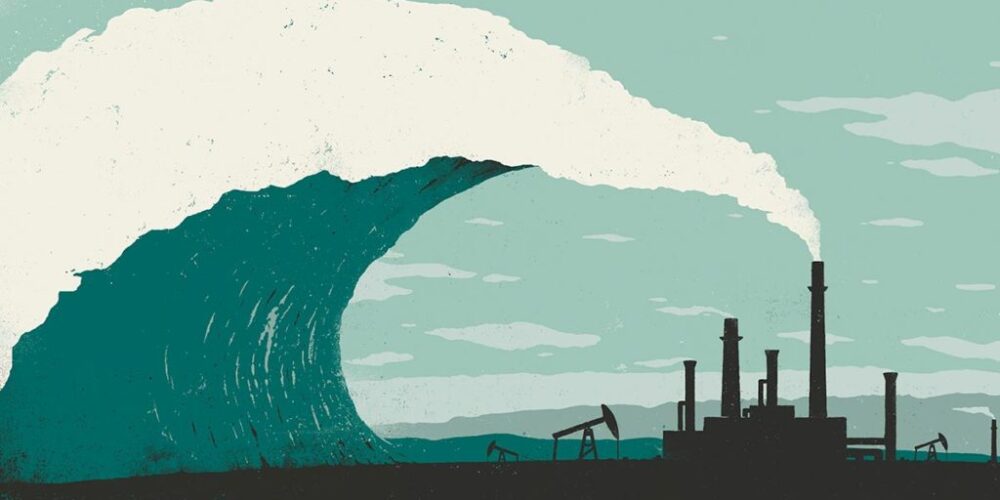Capitalism’s inherent logic—profit above all—drives us toward global collapse. Wars, climate breakdown, and ecological destruction are not accidents but symptoms of an economic system that demands endless growth on a finite planet, and endless destruction to sustain its growth. We are witnessing the deaththrow’s of a system in decay – the Capitalist mode of destruction. Capital accumulation requires not only ceaseless resource extraction, but also a continuous cycle of production and consumption—much of it directed toward waste, war, and obsolescence. The system must find new markets, new enemies, and new crises to manufacture in order to keep the wheels turning. This is not a flaw in the machine, but the engine itself.
The recent catastrophic escalation of conflict in the Middle East, notably Israel’s genocidal assault on Gaza and aggressive provocations towards Iran, and not forgetting the proxy war being faught in Ukraine, starkly illustrates Rosa Luxemburg’s century-old warning: humanity stands before a clear choice—socialism or barbarism. This crisis, with the very real risk of spiralling into a broader regional or even global conflict, exposes the deep irrationality at capitalism’s core. Rather than promoting peace, capitalist powers fuel endless wars, driven not by humanitarian concern, but by the profits of a bloated military-industrial complex.
Capitalism’s incessant drive for infinite growth and profit accumulation, irrespective of human or environmental cost, inevitably breeds instability, destruction, and ecological disaster. Nowhere is this clearer than in the global arms trade and military spending. In 2023 alone, global military expenditure surpassed €2.44 trillion (Stockholm International Peace Research Institute, SIPRI, 2024), much of it directed towards weapons stockpiles that inevitably seek deployment in wars or proxy conflicts. NATO alone spent over €1.26 trillion. Such conflicts are not merely aberrations; they are intrinsic to capitalism, necessary for continued profits and market expansion.
The devastating consequences of these endless wars extend beyond immediate human suffering. War is one of capitalism’s most environmentally destructive activities—producing massive carbon emissions, devastating landscapes, polluting ecosystems, and creating long-term toxic contamination. Military activity alone accounts for an enormous share of global fossil fuel consumption, with the US military ranking among the largest institutional polluters worldwide (Brown University Costs of War Project, 2019). It produces more greenhouse gas emissions than countries like Colombia or Qatar.
Meanwhile, governments prioritise military budgets over social investment. Global health expenditure was approximately €9.2 trillion in 2021 (WHO, World Bank), while international climate finance—public and private—approached €1.2 trillion in 2023 (OECD, 2023). The European Investment Bank committed €36.5 billion to the Green Deal in 2022. Though healthcare spending exceeds military budgets globally, this includes all private and public health expenditures. Military spending, by contrast, is concentrated discretionary funding. Just 5% of global military spending could redirect over €122 billion annually—enough to transform climate resilience, public health, or education systems.
The imbalance reflects not total volume but political will and strategic intent.
Capitalism, with its market-driven logic, proves incapable of addressing the existential threat of climate catastrophe. Conservative estimates attribute 71% of global GHG emissions since 1988
to just 100 fossil-fuel companies (CDP Carbon Majors Report, 2017), nearly all under private capitalist control. Their built-in profit incentives make any ecological transformation antagonistic to their interests. The top five most polluting industries globally—energy (coal, oil, gas), transportation, agriculture (particularly industrial livestock farming), manufacturing (steel, cement, chemicals), and fashion—are deeply embedded in capitalist structures reliant on perpetual growth. Driven by short-term profit maximisation, these sectors resist or significantly delay necessary ecological transitions, prioritising shareholder returns over planetary health. Market-led green initiatives frequently stall due to profit constraints, political resistance, and competition-driven inefficiencies.
In stark contrast, nations utilising state-directed economic planning have made considerable strides. China, despite its ongoing challenges, leads the world in renewable energy investments, controlling over half the global solar panel production and rapidly advancing its electric vehicle sector (International Renewable Energy Agency, 2023). This achievement was not due to market spontaneity but strategic state-led industrial policy and investment. Similarly, Cuba’s planned approach has produced remarkable environmental resilience, emphasising sustainable agriculture, ecological conservation, and innovative biotechnology despite severe resource limitations imposed by imperialist sanctions (Food and Agriculture Organization, FAO, 2022).
Denmark, for example, has committed to a 70% reduction in greenhouse gas emissions by 2030 through a series of national climate action plans. A centrepiece of its strategy is the construction of two “energy islands” in the North and Baltic Seas—state-led hubs that will generate up to 10 GW of offshore wind by 2030, enough to power millions of homes. This is not a market-led initiative, but a product of deliberate public planning and investment, reflecting a national commitment to long-term sustainability over short-term profit. Germany, too, though hampered by neoliberal limitations, has achieved significant advances in its Energiewende (energy transition) through state subsidies, public investment in renewables, and targeted legislation such as the Renewable Energy Sources Act. These gains were not the outcome of market spontaneity but of sustained, deliberate state planning over two decades.
Ireland offers a clear example of how the absence of economic planning hinders progress towards climate and energy targets. Despite having some of the strongest renewable energy potential in Europe—particularly in offshore wind, tidal, and wave power—the Irish state has failed to take direct control of development. Instead, successive governments have ceded this sector to private companies and foreign investors, often without strategic oversight or long-term national planning.
For example, the leasing of offshore wind rights to multinational corporations like Shell and Equinor illustrates how energy sovereignty has been subordinated to private profit. Rather than establishing a publicly owned energy agency to plan, build, and manage Ireland’s renewable infrastructure, the state has relied on private tendering, leaving citizens vulnerable to pricing shocks, profit repatriation, and limited local reinvestment. Public planning could coordinate grid development, offshore and onshore wind integration, battery storage, and community energy systems—creating thousands of skilled jobs and ensuring affordable energy as a public good. It could also create state-led enterprises linked to public institutions such as universities and research centres, fostering innovation and embedding ecological planning in education and national development.
Similarly, public transport, retrofitting of housing stock, and agricultural transition remain fragmented, underfunded, or dominated by lobby interests. A socialist approach would integrate these sectors under a national climate and infrastructure plan—connecting rural and urban development, cutting emissions, and enhancing quality of life. With democratic planning, Ireland
could move from being a policy laggard to a climate leader—anchoring the transition in public ownership, equity, and long-term social need.
Such examples demonstrate that confronting climate change and ensuring sustainable futures demand comprehensive, democratic economic planning. Planning allows societies to prioritise essential human needs and ecological sustainability over the anarchic and destructive imperatives of capitalist competition.
Economic planning must extend beyond environmental sustainability alone; it must encompass peace and demilitarisation. A socialist planned economy, rooted in international cooperation and solidarity, would reallocate resources away from military expenditure towards education, healthcare, renewable energy, and social infrastructure—sectors vital for genuine human security.
Today’s escalating conflicts are fuelled by capitalist logic, perpetuated by military-industrial interests that profit from warfare. Leaders such as Trump, Starmer, EU Commission President Ursula von der Leyen, and other EU elites actively support and enable aggressors, and wanted war criminasl like Netanyahu, not out of political weakness, but because they serve imperialist objectives. Israel’s genocide in Gaza has been directly funded, aided, and defended by global imperialist powers including the US, UK, Germany, other EU states, and indeed Ireland.
Furthermore, this drive toward genocide and war is significantly amplified and legitimised by mass media—both large private conglomerates and state broadcasters. These media institutions function as propaganda machines, inverting aggressors into victims and justifying imperialist violence. However, this manipulation is increasingly being exposed, as global audiences witness the reality of genocide streamed live through social media. The growing anti-war movement, coupled with heightened environmental consciousness, represents a crucial front in challenging this propaganda and making continued support for such violence politically untenable.
The critical importance of the anti-war movement cannot be overstated, and it must align itself closely with environmental activism. Both movements share a common enemy—the capitalist system that commodifies human life and nature, turning peace and ecological stability into obstacles to profit.
In contrast, socialist internationalism calls for planning based on peace, cooperation, and sustainable human development. Socialist economies would dismantle the military-industrial complex, reducing global tensions by eliminating the profit motive from war-making. International planning could redirect efforts towards global renewable energy infrastructure, equitable distribution of resources, and genuine humanitarian support.
Ultimately, humanity faces a stark choice between capitalist barbarism—manifested through endless wars, environmental destruction, and human suffering—or socialist planning, offering a sustainable, peaceful, and equitable future. The current crisis in Gaza underscores the urgent necessity of choosing socialism, with democratic economic planning providing the only realistic alternative to global catastrophe. Our next articles will delve deeper into how to build political movements capable of achieving this essential transformation, grounding planning firmly in democratic control and international solidarity.
Note: Previous articles in this series can be found on the Socialist Voice website.





